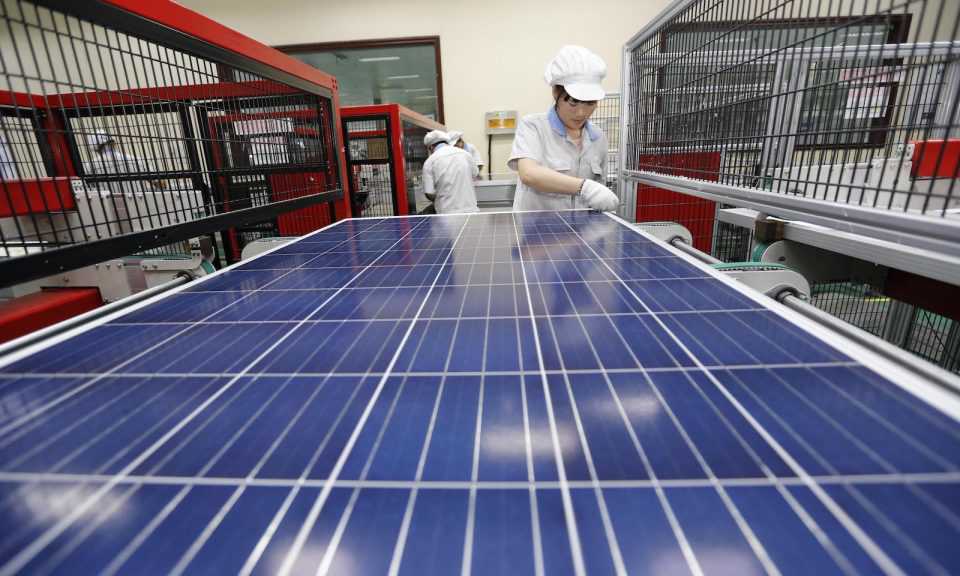Beijing needs to tackle the ‘chronic disease’ infecting industry
24 January, 2018

China's Solar Panel industry has been hit by US trade tariffs. Photo: AFP
Overproduction plagues a vast array of sectors and has a destabilizing impact on global markets
It has been described as a “chronic disease” which will spread and infect the whole economy. Unless an antidote is found for the virus known as overproduction, it could derail China’s plan for high-quality growth and trigger global repercussions.
Earlier this week, the Chinese Premier Li Keqiang reiterated the mantra of fighting poverty, controlling pollution and reducing risks. These are the “three tough battles” the country faces during the next 12 months.
Even though China’s economy expanded at 6.9% last year, President Xi Jinping has made solving the “overproduction” problem a priority by accelerating supply-side reform.
“While excessive supply may mean meager profits, massive production can still generate huge capital and exert a certain market influence,” said Chen Gong, the chief research fellow with the influential private strategic think tank Anbound in Beijing. “But that is not the case now.
“A typical representative of overproduction is the previous economic model in China. Excessive production led to environmental problems, wealth disparities, social instability and a rapid rise in various costs,” he told the state-owned Global Times. “But what is more complicated is that overproduction also has an impact on global markets, affecting the competitive relationship among countries.”
In layman’s terms, that means “dumping” cheap goods across the globe. To illustrate the scale of the problem, you only have to look at data released by the China Academy of Information and Communications Technology in Beijing. It makes stark reading.
Domestic smartphone sales dropped in December by 32.5% to 42.6 million compared to same period in 2016, which showed that the sector is reaching saturation point.
But manufacturers have continued to churn out new models, along with component suppliers, in the hope of boosting export orders. This glut risks putting many of them out of business if the doors start to close on overseas markets.
The warning signs are there throughout China’s manufacturing industries. Already the bike-sharing craze that left major cities, such as Shanghai, Beijing, Guangzhou and Shenzhen, creaking under huge piles of bicycles, has caused serious social problems.
Many of the early startup companies folded in the second half of 2017, with customer liabilities of more than 1 billion yuan (US$155 million), the state-owned Workers’ Daily reported last month. Independent sources put the figure much higher.
What cannot be disputed is that bicycle manufacturers, which cashed in on the boom, are now facing possible bankruptcy. Many were still waiting to be paid for earlier orders when these bike-sharing companies went bust.
“All this dramatically illustrates a recurring problem that China’s economy faces: the emergence of a business opportunity that quickly translates into overproduction,” Xiao Xin, a business journalist at Global Times, said. “To cure this chronic disease … [we] need a rethink [about business practices].”
But the depth and scale of overproduction goes beyond smartphones and “smart bikes”. Even China’s bloated steel industry has been put on a crash diet in a move to shed excess capacity.
Forced mergers, closures and “marriages of convenience” have been ordered by Beijing after the industry was hit with punitive tariffs by the United States and the European Union for “dumping” cheap steel on their markets
“Our current [global] overcapacity issue is bad,” John Ferriola, the chief executive of US group Nucor, told the Financial Times at the World Steel Association’s annual general meeting in Brussels last year.
“[It] results in a high level of exports that in some cases are illegally subsidized and dumped in other nations,” he added, in a remark aimed at China’s steel companies.
Overproduction in a vast array of industries from cement to cutlery is having a major destabilizing effect across the globe. But it is China that the US President Donald Trump has his sights fixed on.
On Tuesday, his “America First” policy came into sharp focus when the US approved controversial tariffs on imported washing machines and solar panels.
The move will hit China, which leads the world in solar panel production. Naturally, it prompted an angry reaction from Beijing.
“Together with other WTO [World Trade Organization] members, China will resolutely defend its legitimate interests,” said Wang Hejun, a government spokesman.
Overproduction might be a Chinese “disease”, but finding the right cure will have a major impact on global trade and the way the world’s second-largest economy does business.
